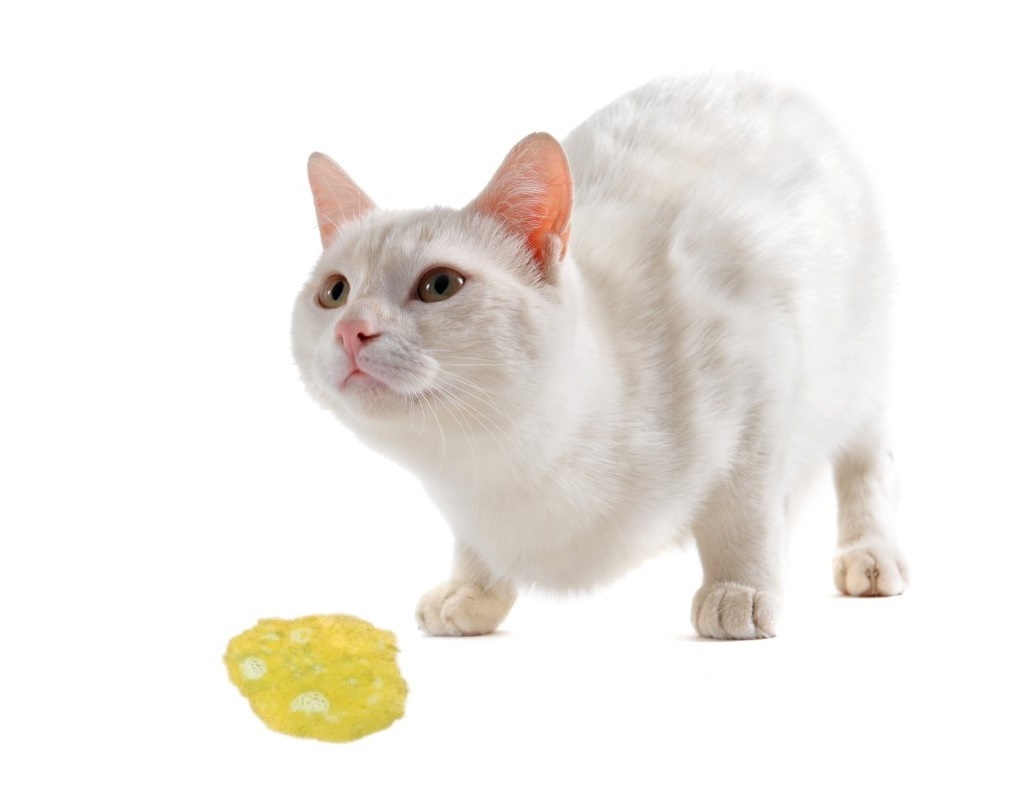
Why Is My Cat Vomiting?
Does your cat groom and then start hacking? The sound of a cat throwing up a hairball is familiar to many cat owners. Hairballs cannot be digested, so if your kitty vomits up a hairball every now and then, it is not usually anything to be concerned about. When vomiting becomes frequent or looks like coffee grounds, it is time for your kitty to see the vet. Vomiting is uncomfortable for any cat and can be a sign of something more serious than simple digestive upset. Cat vomit can contain yellow bile, blood, mucus or undigested food. It can be slimy, foamy or a clear liquid. Below are some of the most common reasons why a cat throws up:
- Hairballs - This is the most common reason why cats throw up. When cats groom themselves, they swallow hair and it can get stuck in their stomachs. The body will try to expel the hair by vomiting. To reduce hairballs, feed your cat a high-moisture diet and add fiber. Improving digestive motility can help pass the hair through the digestive tract and reduce hairballs.
- Gastrointestinal Condition - Cats with Inflammatory Bowel Disease (IBD/IBS), ulcers, constipation, gastroenteritis or acid reflux may throw up due to stomach upset or intestinal inflammation.
- Parasites - Kittens are especially susceptible to parasitic worms, including roundworms, hookworms and tapeworms. Intestinal worms can cause vomiting, diarrhea and a bloated abdomen.
- Pancreatitis - Feline pancreatitis is often related to inflammation in the GI tract and the overproduction of pancreatic enzymes needed to digest food. The most common symptoms include poor appetite, lethargy, vomiting, weight loss, dehydration, and diarrhea.
- Kidney Disease - The kidneys filter out toxins in the blood. When kidney function is impaired, the toxins and metabolic waste build up. One of the hallmark symptoms of kidney disease is acid stomach and nausea.
- Hyperthyroidism - The thyroid gland helps to regulate metabolism. An overactive thyroid can cause a cat to lose weight despite an insatiable appetite. Other signs of hyperthyroidism may include increased thirst, increased urination, restlessness, poor coat quality and vomiting.
- Diabetes - Diabetes is a metabolic disorder that occurs when the body does not produce enough insulin to fuel metabolism. It results in high blood sugar, weight gain and compromised digestion. The most common signs of diabetes in cats are increased thirst and frequent urination. Elevated blood sugar levels can cause nausea and vomiting.
- Food Allergies - Cats thrive on a high-moisture species-appropriate diet. They are carnivores and were not designed to eat grains, chemicals and fillers that are found in many cat foods. These ingredients can cause digestive problems and weaken immunity. Many cats are allergic to common meat proteins, such as poultry or fish, and eating these foods can cause vomiting or diarrhea.
- Diet Changes - When making diet changes, it is important to make changes slowly. Some kitties can get an upset tummy, vomiting or diarrhea if changes are made too quickly.
- Ingestion of Toxin or Foreign Body - Cats like to play with household objects like strings and rubber bands. Some cats may ingest non-food items. The body will naturally try to vomit the item out. If your kitty has eaten a poisonous houseplant, chocolate or a chemical cleaner, it is important to contact your vet right away or call the ASPCA Pet Poison Hotline at 888-426-4435.
- Cancer - The most common feline cancer is intestinal lymphoma. Feline lymphoma and lymphosarcoma usually affect the digestive system. The symptoms mimic those of cats with IBD and IBS. Cats with feline intestinal lymphoma usually have a history of vomiting, diarrhea and/or inflammation of the intestinal tract.
Healthy cats may throw up hairballs every now and then. If your cat has an isolated incident of vomiting and then goes back to eating and pooping like normal, it was probably nothing to worry about. When cats are vomiting on a regular basis, it should be discussed with your veterinarian. Many times vomiting can be a sign of an underlying condition.
|